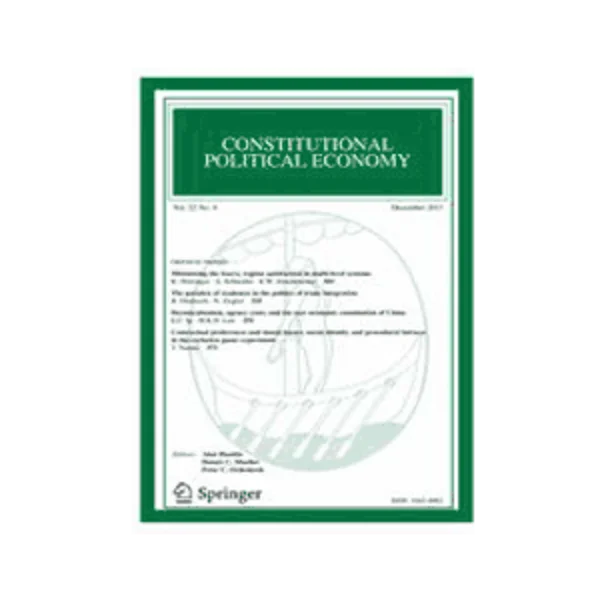-
the paradox of weakness in the politics of trade integration
جزئیات بیشتر مقاله- تاریخ ارائه: 1392/07/24
- تاریخ انتشار در تی پی بین: 1392/07/24
- تعداد بازدید: 1071
- تعداد پرسش و پاسخ ها: 0
- شماره تماس دبیرخانه رویداد: -
in his 1960 seminal contribution to game theory and its applications, the strategy of conflict, thomas schelling suggested that in international negotiations, strong international opposition may be an asset rather than a liability. rather than constraining it, the opposition would enlarge the opportunity set thus making it easier to successfully conclude international negotiations. this property, which is also known as the schelling-conjecture, shares some aspects with constitutional economics, namely the two-level approach suggesting that it might be beneficial for all parties to give up some power by tying one’s hands. in this paper we examine by means of a simulation study how far we can take this notion in the politics of trade integration. in explicitly marrying schelling’s 1960 idea with the 1988 two-level approach by putnam and embedding the result into the political economy of trade we find that the threat of a domestic opposition or national institution having a veto power frequently but not always delivers a more favorable outcome for the respective trade representative at the international table. whether the schelling-conjecture applies or not actually depends on the subtle interplay of a “bully effect” and a “serenity effect”.
مقالات جدیدترین رویدادها
-
استفاده از تحلیل اهمیت-عملکرد در ارائه الگوی مدیریت خلاقیت سازمانی و ارائه راهکار جهت بهبود
-
بررسی تاثیر ارزش وجوه نقد مازاد بر ساختار سرمایه شرکت های پذیرفته شده در بورس اوراق بهادار تهران
-
بررسی تأثیر سطح افشای ریسک بر قرارداد بدهی شرکت های پذیرفته شده در بورس اوراق بهادار تهران
-
بررسی تأثیر رتبه بندی اعتباری مبتنی بر مدل امتیاز بازار نوظهور بر نقد شوندگی سهام با تأکید بر خصوصی سازی شرکت ها
-
تأثیر آمیخته بازاریابی پوشاک ایرانی بر تصویر ذهنی مشتری پوشاک ایرانی (هاکوپیان)
-
تاثیر میانقاب بنایی بر پاسخ لرزه ایی قاب های بتنی
-
تکنولوژی موتور- درایو یکپارچه (integrated motor drive) آنالیز مواد و تجهیزات و پروسه ساخت
-
سامانه های هوشمند ناوبری حمل و نقل راهکار افزایش کارایی شبکه حمل و نقل جاده ای
-
مطالعه لیتوژئوشیمیایی طلا در منطقه میاردان بستان آباد، آذربایجان شرقی
-
آنالیز محیط بی نهایت دو ماده ای با رفتار ایزوتروپ جانبی تحت نیروی استاتیکی
مقالات جدیدترین ژورنال ها
-
مدیریت و بررسی افسردگی دانش آموزان دختر مقطع متوسطه دوم در دروان کرونا در شهرستان دزفول
-
مدیریت و بررسی خرد سیاسی در اندیشه ی فردوسی در ادب ایران
-
واکاوی و مدیریت توصیفی قلمدان(جاکلیدی)ضریح در موزه آستان قدس رضوی
-
بررسی تاثیر خلاقیت، دانش و انگیزه کارکنان بر پیشنهادات نوآورانه کارکنان ( مورد مطالعه: هتل های 3 و 4 ستاره استان کرمان)
-
بررسی تاثیر کیفیت سیستم های اطلاعاتی بر تصمیم گیری موفق در شرکتهای تولیدی استان اصفهان (مورد مطالعه: مدیران شرکتهای تولیدی استان اصفهان)
-
بررسی تاثیر کیفیت ادراکی برند بر وفاداری مشتری، با توجه به نقش میانجی تاثیر ذهنی مشتریان از برند(مطالعه موردی آژانس مسافرتی زاگرس)
-
نقد جامعه شناختی نمایشنامه چهارصندوق بهرام بیضایی
-
تحلیل روند سیادت سادات از زمان پیامبر (ص) تا قرن اخیر در ثبت احوال ایران
-
ارزیابی عملکرد کارکنان شهرداری های غرب گیلان بر اساس مدل کارت امتیازی متوازن
-
نکاح معاطاتی زنا نیست




سوال خود را در مورد این مقاله مطرح نمایید :